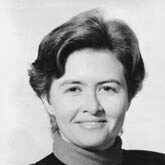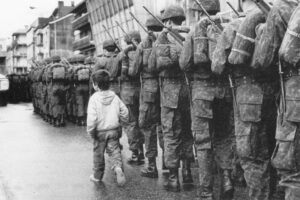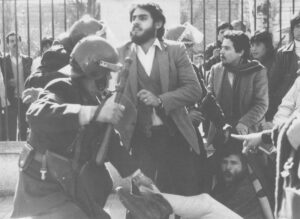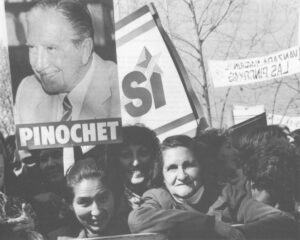Pamela Constable
- 1989

Fellowship Title:
- The Impact of Pinochet's Dictatorship in Chile
Fellowship Year:
- 1989

Crime and Impunity in Chile: Perverting the Law of a Legalistic Land
Item: A teacher is kidnapped by the secret police, and his family files a petition for judicial protection, which is rejected after the government asserts the man is not in custody. Several months later, he is found in a prison camp, recovering from torture. The court requests an explanation, and the government replies that its original statement was the result of an “administrative error.” Satisfied, the court rejects the family’s petition again. Military Parade in Concepción, Chile. (Photo by APF Fellow Pamela Constable) Item: A prominent politician is ordered expelled from the country by government decree; he appeals the order on grounds that the decree is unconstitutional. While the appeal is pending, the military junta issues a new law saying that any previous decrees found to be incompatible with the constitution will now automatically become amendments to it. The court rejects the appeal, and the politician is flown into exile. Item: A judge is named to investigate the disappearances of 12 Communist Party members, all of whom were reportedly seized by state intelligence agents. After

Chile’s Lost Generation
We were the generation that thought we had the world in our hands. We were building a new country, and we gave our all to the cause. We lived and felt intensely, every moment. Estela Ortiz, 39, a communist youth activist during the socialist government of Salvador Allende (1970-73). Our cause was to rebuild the country, to overcome poverty, to create a modern economy. We earned terrible salaries but there was much mystique. We were making a revolution. Christian Larroulet, 38, an economic planner for the military regime of Gen. Augusto Pinochet (1973-present). Their words are startlingly similar, their ages almost identical, their houses a few miles apart. But these two Chileans live in worlds that have never touched. They represent two sides of a generation that was convulsed by an ideological struggle and permanently marked by the military coup of September 11, 1973. Ortiz was on the losing side: her youthful dreams of a socialist revolution were crushed by the coup and her family shattered by repression. In 1976 her father, a lifelong communist,

The Dictator
On September 30, 1988, Augusto Pinochet Ugarte was in majestic fighting form. Chile’s barrel-chested, 72-year-old dictator had just nominated himself for president, with the concurrence of his three fellow military commanders, and officials were gathered in a cavernous hall for his acceptance speech. Resplendent in white dress tunic and tri-colored sash, the general rose from a red velvet throne. Augusto Pinochet Ugarte (Photo By Josée Agurto) In thundering tones, he recalled the “glorious” act that had freed Chile from Soviet “tyranny” with the military coup of September 11, 1973, and the armed forces’ 15 years of dedication to rebuilding society. But he warned that Chileans have “still not freed ourselves from the destructive and dissolute presence of Marxism,” and that his firm guidance was needed to complete the task. “Liberty,” he declared, “must not become the instrument of its own destruction!” There was no question in the general’s mind that he would be elected in the “yes-no” presidential referendum. Crowds cheered him at rallies, aides had assured him the people were grateful for his sacrifice,
